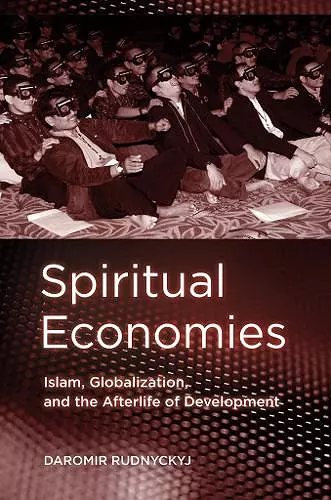Spiritual Economies
Islam, Globalization, and the Afterlife of Development
Format:Paperback
Publisher:Cornell University Press
Published:15th Nov '10
Currently unavailable, and unfortunately no date known when it will be back
This paperback is available in another edition too:
- Hardback£108.00(9780801448508)

In Europe and North America Muslims are often represented in conflict with modernity—but what could be more modern than motivational programs that represent Islamic practice as conducive to business success and personal growth? Daromir Rudnyckyj's innovative and surprising book challenges widespread assumptions about contemporary Islam by showing how moderate Muslims in Southeast Asia are reinterpreting Islam not to reject modernity but to create a "spiritual economy" consisting of practices conducive to globalization.
Drawing on more than two years of research in Indonesia, most of which took place at state-owned Krakatau Steel, Rudnyckyj shows how self-styled "spiritual reformers" seek to enhance the Islamic piety of workers across Southeast Asia and beyond. Deploying vivid description and a keen ethnographic sensibility, Rudnyckyj depicts a program called Emotional and Spiritual Quotient (ESQ) training that reconfigures Islamic practice and history to make the religion compatible with principles for corporate success found in Euro-American management texts, self-help manuals, and life-coaching sessions. The prophet Muhammad is represented as a model for a corporate CEO and the five pillars of Islam as directives for self-discipline, personal responsibility, and achieving "win-win" solutions.
Spiritual Economies reveals how capitalism and religion are converging in Indonesia and other parts of the developing and developed world. Rudnyckyj offers an alternative to the commonly held view that religious practice serves as a refuge from or means of resistance against modernization and neoliberalism. Moreover, his innovative approach charts new avenues for future research on globalization, religion, and the predicaments of modern life.
"In anthropology, the value of inspiring ideas in any period depends on their realization in convincing ethnographic achievements. In this regard, Spiritual Economies is a bravura performance: at the site of Krakatau Steel, it shows the power and kinship of experiments in neoliberal economy, religious revival, ethnography—and para-ethnography—all in the same frame."—George E. Marcus, author of Ethnography Through Thick and Thin
"In the clearly written and strongly argued Spiritual Economies, Daromir Rudnyckyj brings together the anthropology of development and globalization and the anthropology of the rising Islamic piety movement to show that religious resurgence can be part of globalizing economic development, not necessarily a refuge from it. He traces many of Indonesia's recent political and religious transformations from the vantage point of a steel factory, where the ESQ spiritual training program combines spiritual guidance, business success training, and a vision of Islam as predictive and encompassing of science and technology."—John Bowen, Dunbar-Van Cleve Professor in Arts & Sciences, Washington University in St. Louis, and author of Can Islam Be French?
- Winner of Cowinner, 2011 Sharon Stephens Prize (American Eth.
ISBN: 9780801476785
Dimensions: 229mm x 152mm x 21mm
Weight: 454g
304 pages